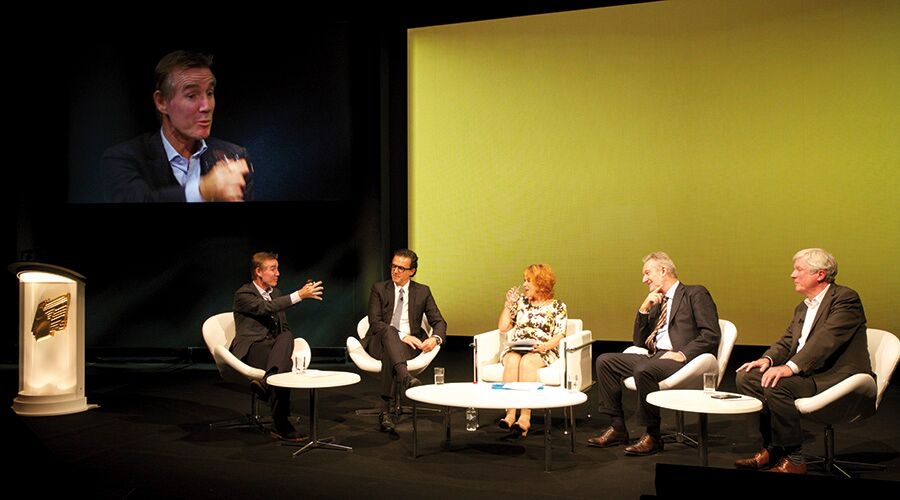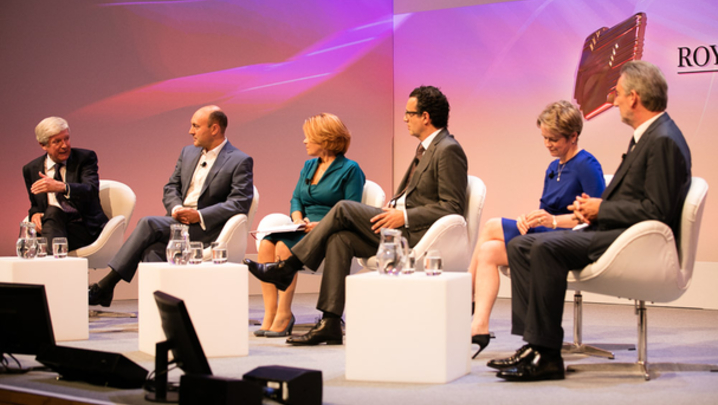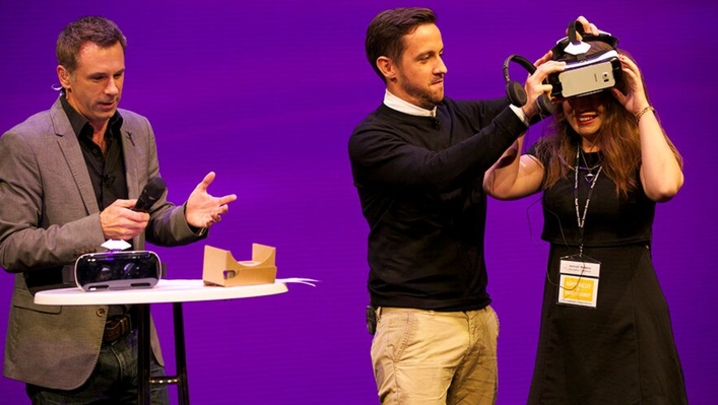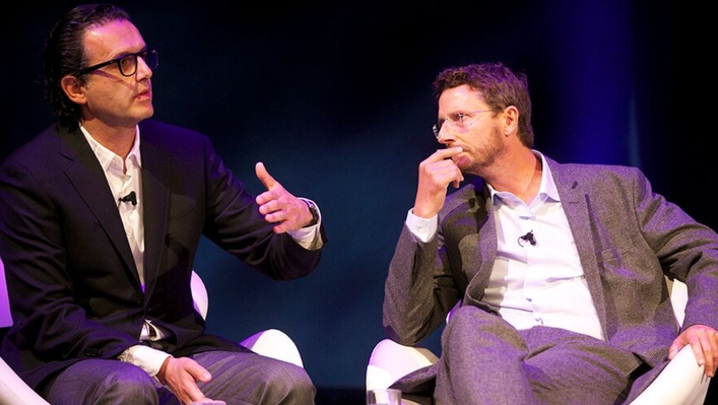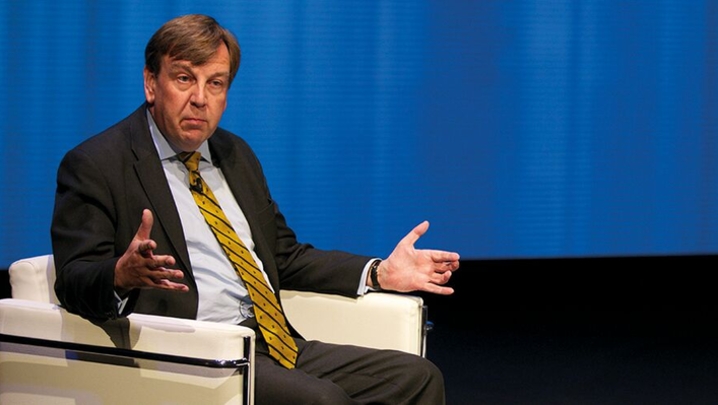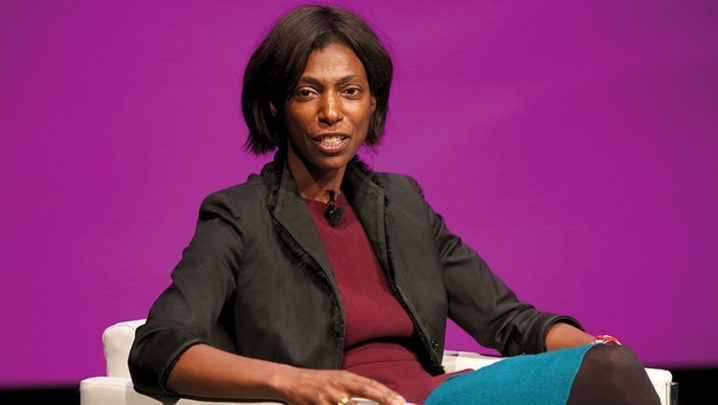Cambridge Convention 2015 Session Fifteen: Four television heavyweights predict how the future might unfold for them
It was time to take stock. After three days of intense and stimulating debate, Lorraine Heggessey corralled some of broadcasting’s big beasts onstage to chew the fat at the final session of Cambridge 2015. Was television heading for Happy Valley or was the House of Cards about to collapse?
The panellists agreed that there was much to keep their chins up between now and 2020. “Television has got a great future,” said ITV CEO Adam Crozier, making his convention debut. “It is a constantly changing future and, yes, it’s got its challenges but there is a lot of opportunity, too.
“One thing that won’t change is the desire for great content. The key becomes who makes the best content. They are the people who, in the end, will win.”
Who could buy the best content, produce and distribute it, were all important – but none of these would work unless the content was “fantastic”, stressed the ITV CEO, who has overseen the emergence of ITV Studios as a key US player.
As for traditional TV being usurped by online platforms, Crozier was sceptical. Yes, things were evolving – particularly “at the younger end of the audience”. But, provided the content was good enough, people would find it in the most convenient and cheapest way.
In any case, change would occur over a long time. New players were not going to replace old ones. “It never happens, it just becomes part of the industry’s overall structure,” said Crozier, perhaps mindful that ITV’s 60th birthday was imminent.
“One of the things we’ve done better in this country than in the States is… they are far too expensive out there and they try to be a bit too King Canute-like and slow [the pace of change] down – over here, people have said: ‘If this is going to happen, it is better to do it ourselves.’
“We’ve all gone online and made our product available to people on as many platforms as possible. That is a very sensible thing to do because it makes it harder for someone else to do it as well.”
Would ITV consider moving channels online, probed Heggessey. “No, all our channels are available online.”
Further changes were being introduced to the ITV Player, now responsible for 20% to 25% of viewing to ITV’s UK channels, according to the CEO. “Our view is that a screen is a screen and a viewer is a viewer”, regardless of how people watch.
Channel 4 CEO David Abraham was almost as optimistic as his ITV peer: “For us, it is very much Happy Valley.… The only cloud on the horizon is: will the regulatory framework, which we’ve benefited from over the past 30 years, remain as potent to support that creativity?”
Did he know more than he was letting on about culture minister John Whittingdale’s real thoughts on the possible privatisation of Channel 4? The DCMS was revealed the following week to be much more actively pursuing privatisation, thanks to an enterprising photographer. Or maybe Abraham was referring to the latest review of the terms of trade, announced to Cambridge 48 hours earlier?
It was, though, no longer enough “just to innovate creatively, we have to innovative technically”. Abraham agreed with his ITV colleague that British broadcasters had embraced online innovation, but more technological disruption was coming soon.
The Channel 4 leader was struck by News UK’s recent acquisition of digital ad upstart Unruly for a reported £114m.
“That whole world of how video is discovered in a fully fragmented and connected environment expands the notion of what a channel actually is,” he said. “How it will find its audiences and how data will connect great content for audiences.… The way in which we, as an industry, collaborate with the next wave of technological excellence in the UK is a fantastic opportunity for all of us.”
As a platform operator, rather than a broadcaster, Virgin Media’s Tom Mockridge’s concerns were different. He, too, however, was living in Happy Valley, as Virgin was part of a sector experiencing “phenomenal growth”.
"People were writing off terrestrial channels five years ago… but they’ve surged back"
He said: “[We have] enormous strength here in the UK.… Put that together with the phenomenal demand that’s been created… [and] the ability to access an audience that has grown exponentially over the past five years.
It is going to continue to do so.”
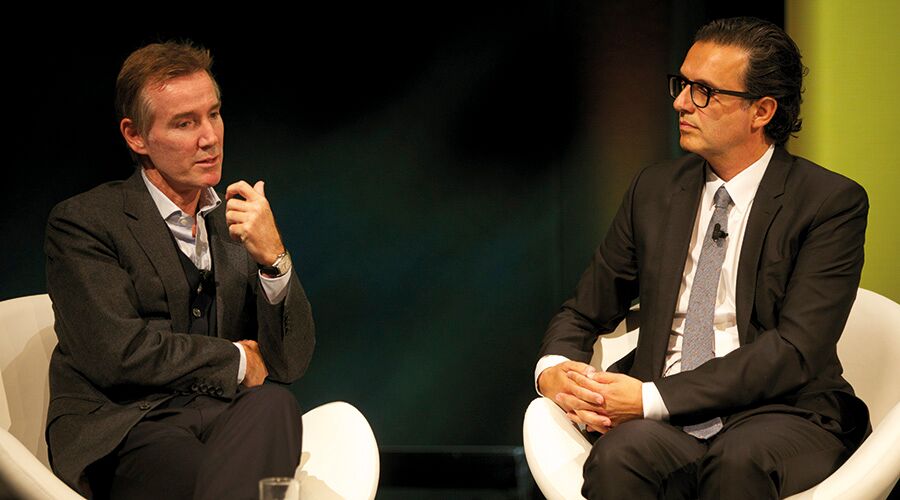
There were challenges but, ultimately, creative people had more opportunities than ever before to reach audiences. “It is a fantastically interesting time to be in the sector,” said the Virgin CEO.
Would channels continue to be the most important way of curating content on Mockridge’s platform, asked Heggessey. Or would catch-up and other VoD services eventually take over?
“The pie is growing bigger, linear channels remain very significant. There has been so much growth in pay-channels in this country in the
last five to 10 years. That’s driven the incremental growth.
“People were writing off terrestrial channels five years ago… but they’ve surged back. We have a combination, now, with various forms of on-demand.
“We’re constantly challenging ourselves and thinking of how we can make [content] more accessible.… The beauty of it is that the balloon is expanding, overall.”
Was it frustrating now for audiences to find that a show was not available on demand, Heggessey asked.
“There should be a 30-day catch-up window,” replied Mockridge. “The good news is that people want to watch this stuff.… The demand is there, not only for everything that is new, but for every programme that’s ever been made that is accessible and producing a revenue stream. These opportunities are sensational.”
Turning to Tony Hall, Heggessey remarked that the BBC had experienced “another interesting week”. Where did he stand – was it a case of House of Cards or Happy Valley for the beleaguered Beeb?
“I actually think it’s both,” opined the Director-General, who always appears to be on the side of programme-makers.
Over the previous two days he’d been struck by two things – the need to ensure that creative cultures were fully nurtured and the keen sense
of risk-taking fostered by the UK’s creative ecology. That word again. Later, as the debate continued, Heggessey wanted to know if the British television sector talked up its so-called unique “ecology” too much. For now, she allowed Hall time to tackle his favourite theme.
“As long as we keep emphasising the creativity of what we do in Britain and have the ability to take risks, we’ve got a great future,” Hall reiterated.
As the conversation gathered pace, the mood of optimism began to be tempered by what was, arguably, a more realistic picture of British TV’s position in the global pecking order.
“I don’t want to talk down the industry but, although we’re second [to the US], we’re miles behind. There’s a lot of ground to make up,” warned Crozier. “Collectively, with ever more competition, we’re all going to have to get better at this and be more creative.
“A lot of the hits that are running across the world that came out of the UK are relatively quite old…”
If Crozier meant I’m a Celebrity… Get Me Out of Here! or Strictly Come Dancing, launched in 2002 and 2004, respectively, he wasn’t saying.
“We need the next round of programmes to come through. They will probably be scripted, rather than entertainment shows, because that’s the locus for everyone,” he added.
Ah, scripted. Delegates had heard how drama dominates global content plays. Every genre appears to have its place in the sun.
Crozier wondered if Americans were over-investing in scripted. He explained: “There is so much scripted being produced in the US right now that it will definitely not all work. Some of it is quite mediocre.
“Channels are looking to get noticed as they look to negotiate their affiliation fees. What they are really worried about is a big drop [in ratings and subscribers], so they are trying to stand out from the crowd.
“The problem they’ve got is that a lot of their business models aren’t suited to scripted shows. That’s not how
it works. I think there is going to be some fall-out.”
"As long as we keep emphasising the creativity of what we do in Britain and have the ability to take risks, we’ve got a great future"
No one mentioned that, back home, Downton Abbey’s final season was upon us. But Heggessey did bring up the lacklustre performance of ITV’s flagship channel (see box, below).
Staying with drama, were the big beasts worried that Netflix was prepared to pay so much for marquee drama?
Hall suggested that the VoD service needed to win only once or twice a year, [but] “all of us have to win every day…. When you look at the cost of commissioning something from Netflix, such as House of Cards, versus what we can all do with the same amount of money…
“Look at the hours of drama we can produce and our [shows are] watched by a far greater part of the population than are watching Netflix. I think the two models are creatively very different, too.”
How is ITV going to cope in this competitive market, where Netflix can pay a reputed £100m for The Crown?
“That’s just one example,” Crozier responded. “I can’t think of another one. We didn’t go for that. I can’t think of another one where we have been outbid.
“The truth is, as a commercial broadcaster, we wouldn’t pay that much for a drama.
“It’s completely mad. It wouldn’t work for us. That’s why we don’t get involved in making films. You have to know what your business model is.”
Netflix aside, Crozier pointed out that there were many US broadcasters, given everything they’ve been through, who were, if anything, shifting to shorter drama series because the risk involved in doing long runs was too great.
Turning to Mockridge, Heggessey asked if he thought that there had been too much focus on the BBC at Cambridge. He disagreed: “The conference has had fantastic breadth.… This has been a very good conference and covered a lot of key issues.
“The BBC is a big, central part of the creative sector in the UK.… We are very, very strong supporters of that.”
The BBC, however, is facing a number of threats. Even its time-honoured coverage of the Olympic Games is no longer a certainty, following Eurosport’s recent e1.3bn, Discovery-backed deal for exclusive rights.
Would Channel 4 and ITV be bidding for the Olympics, asked Heggessey. Crozier gave the only single-word answer we had heard in three days of talking.
“Yes,” he stated emphatically. Abraham said his station would continue to concentrate on the Paralympics.
Focusing on Hall, a BBC without the Olympics would surely be unimaginable, prodded Heggessey. “We’ve got the Olympics until 2020. We did a fantastic job in 2012. We’re going to do a great job next year…,” said the Director-General.
Cheque-books would, therefore, be at the ready, noted Hall’s interlocutor. “A very modest chequebook in our case,” said Hall in an aside, perhaps already beginning the game of poker with ITV.
Concluding the debate, the chair invited panellists to identify their biggest competitive threat. The most interesting answer came from Abraham. He mentioned “algorithms” as the gravest danger to the TV business in the coming years.
Abraham was concerned that broadcasters might eventually go the way of the dinosaurs if the behemoths of the tech world further refined their offerings.
He said: “In the long term, how do people discover individual pieces of content – what will be the technology that enables that to happen…?
“We have to morph into being, as we [already] are in so many ways, both technology companies and creative companies, working together. If we fail to do that, the future will go elsewhere.”
No one said that it wasn’t a jungle out there.
The panellists were: David Abraham, CEO, Channel 4; Adam Crozier, CEO, ITV; Tony Hall, Director-General, BBC; and Tom Mockridge, CEO, Virgin Media. The session was chaired by Lorraine Heggessey, Chair, Grierson Trust, and Advisor, Channel 4 Growth Fund; It was produced by John Ibbotson and Martin Stott.
Does ITV face a US takeover?
Is ITV CEO Adam Crozier taking meetings with suitors, probed session chair Lorraine Heggessey.
‘When we started five years ago, we said we needed ITV to become a much more robust, balanced company. That meant not being reliant on advertising, but growing a very strong production arm and digital presence,’ he replied. ‘We’re well on the way to doing that. ITV’s value has gone from under £2bn to between £10bn and £11bn.
‘That’s because lots of people are doing a really good job in delivering that. We think we have a fantastic future as a stand-alone company. Unless it’s escaped anyone’s attention, a lot of the consolidation is actually being done by us.’
Might Discovery bid for ITV? ‘I heard the comment yesterday about Discovery and ITV, and, in time, we may be interested in buying Discovery,’ countered Crozier to sustained audience applause. ‘It’s a small fact, but we’re actually roughly the same value as it is.
‘The world has moved on a long, long way. We’ve got a very clear future and we are very focused on delivering that.’
But if ITV did come under US ownership by 2020, Heggessey persisted, what impact would that have on the ecology of British TV?
‘I genuinely don’t think that will be the case. As a public company, we have lots of American shareholders today, including Liberty,’ said Crozier. ‘It doesn’t make any difference, because all any shareholder really wants is to run a very successful company. That’s what our job is and ownership doesn’t really impact on that.’
C4 CEO David Abraham added: ‘It won’t be Adam’s decision who owns ITV. He is running ITV, but it will be his shareholders who make the decision [to sell to the US].
‘Once that happens, there will be cultural consequences in the mid- to long term. To say otherwise is to be in denial.’
What’s up with ITV1’s ratings?
While it was true that ITV’s overseas production business was growing, at home the main channel was declining quite rapidly, noted session chair Lorraine Heggessey.
So, how was CEO Adam Crozier addressing this problem? ‘Viewing ebbs and flows. A couple of years ago, we had a fantastic year, up by around 4%,’ said Crozier. ‘What [the recent fall] means, candidly, is that we didn’t get all the decisions right about what we put on air.’
There had been issues in daytime, the soaps were down, so was some of the sport, he added. There had also been problems with factual, especially at 9:00pm, but drama was ‘pulling up.’

